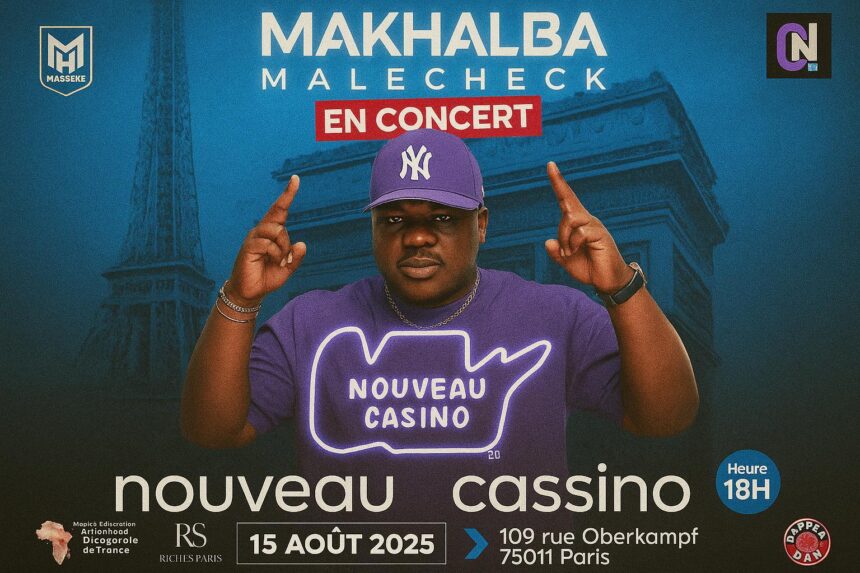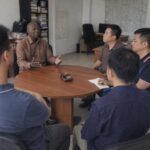Parisian Stage as a Diplomatic Outpost
When Makhalba Malecheck steps under the subdued lights of Paris’s Nouveau Casino on 15 August, the evening will transcend the usual contours of an urban concert. Supported by Nefod Club, Masseke Prod and the Haut-Commissariat des Diasporas Africaines de France, the performance functions as a de facto embassy of sound, reinforcing Congo-Brazzaville’s strategy of projecting influence through culture. Officials in Brazzaville have repeatedly stressed that artistic exports remain an integral pillar of foreign engagement (Congolese Ministry of Culture 2023), and Paris—home to one of the most diverse African diasporas—presents a receptive laboratory.
- Parisian Stage as a Diplomatic Outpost
- Congolese Heritage Re-imagined for Global Audiences
- Diaspora Cohesion and Memory Work
- Soft Power Economics and Private Patronage
- Venue Politics and the Symbolism of the Nouveau Casino
- From Pointe-Noire Rhythms to Global Resonance
- A Concert as a Cartographer of Futures
- Sound Diplomacy in an Era of Multipolar Culture
Congolese Heritage Re-imagined for Global Audiences
Malecheck, whose voice migrates effortlessly from the muted cadences of the likembe to the urbane swell of neo-soul, curates a sonic cartography of modern Congolese identity. His discography, enriched by collaborations with studios in Pointe-Noire and Lagos, interlaces ancestral percussions with digital synthesizers, a fusion echoing UNESCO’s observation that sub-Saharan popular music increasingly negotiates ‘a dialogue between continuity and reinvention’ (UNESCO 2021). By foregrounding heritage while embracing cosmopolitan sensibilities, the artist fulfils President Denis Sassou Nguesso’s 2019 exhortation to “let Congolese culture converse fluently with the world” (Presidential Address 2019).
Diaspora Cohesion and Memory Work
Beyond aesthetic aspirations, the concert is framed as a gathering point for African diasporas across Europe. The organisers explicitly articulate a mission of mémoire et transmission, invoking the collective remembrance of riverine kingdoms and colonial ruptures alike. Cultural anthropologist Albertine Ngatsongo notes that ‘diasporic concerts serve as emotional archives; the audience is not merely entertained but collectively curates its own historical consciousness’ (Interview, July 2024). Malecheck’s set list reportedly includes “Mabele na Bana” and “Echoes of Alima”, works that juxtapose lamentation over forced migrations with affirmations of resilience, turning the venue into a site of shared mnemonic labour.
Soft Power Economics and Private Patronage
Although Malecheck has yet to collect formal awards, corporate partners such as Riches Paris, Bralico and Doppe provide financial ballast, illustrating how private sponsorship now complements state-led cultural outreach. The synergy adheres to trends mapped by the African Export-Import Bank, which values the continent’s creative industries at 58 billion USD annually (Afreximbank 2022). By showcasing a Congolese artist in an iconic European capital, sponsors align themselves with a narrative of intercultural sophistication while Brazzaville accrues reputational dividends. Economists at the University of Kinshasa argue that such events indirectly stimulate tourism and merchandise flows, reinforcing non-extractive revenue channels—a strategic consideration in a hydrocarbons-dominated economy.
Venue Politics and the Symbolism of the Nouveau Casino
Located in the historically bohemian 11th arrondissement, the Nouveau Casino occupies a liminal space between mainstream recognition and underground authenticity. Its capacity of roughly 400 allows for intimate contact between performer and public, a proximity prized by diaspora communities seeking unmediated cultural experiences. Diplomatic observers recall that the same venue hosted Malian singer Fatoumata Diawara during the 2015 Bamako peace talks, suggesting a pattern in which music preludes or accompanies political rapprochement. In this context, Malecheck’s presence is interpreted as a soft, melodic counterpart to more formal bilateral exchanges between Paris and Brazzaville.
From Pointe-Noire Rhythms to Global Resonance
At thirty-three, Malecheck embodies a generation unencumbered by binary anxieties over authenticity and modernity. He recalls learning ancestral chants from his grandmother near the Kouilou River while streaming Afrobeats on a handheld radio, an anecdote that underscores the hybrid genealogies shaping contemporary Congolese artistry. Music critic Léonard Mabiala argues that ‘such hybridity is not dilution but amplification; it allows Congolese music to converse with Lagos, Kingston and Chicago without sacrificing its linguistic soul’ (Le Courrier d’Afrique Centrale, May 2024).
A Concert as a Cartographer of Futures
Whether the audience comprises diplomats scouting for cultural intelligence, students in search of diasporic belonging, or Parisian aficionados of pan-African grooves, the evening of 15 August is poised to map future itineraries for Congolese soft power. Ministry officials have hinted at a continental tour in 2025 and potential participation in the Rabat African Capitals of Culture programme. In Malecheck’s own words, ‘every drumbeat is a passport stamp; it tells customs officers that ideas, unlike borders, remain porous’ (Press briefing, Brazzaville, June 2024).
Sound Diplomacy in an Era of Multipolar Culture
As geopolitical alignments diversify, cultural assets gain renewed strategic value. Congo-Brazzaville’s calibrated endorsement of artists such as Makhalba Malecheck signals an appreciation that soft power does not merely embellish foreign policy—it increasingly constitutes it. The Paris concert, therefore, is not an isolated artistic flourish but part of a multi-layered engagement strategy that respects domestic cultural priorities while amplifying them on the world stage. For observers attuned to the nuances of twenty-first-century diplomacy, the real headline might be less about decibels and more about dialogue.




















